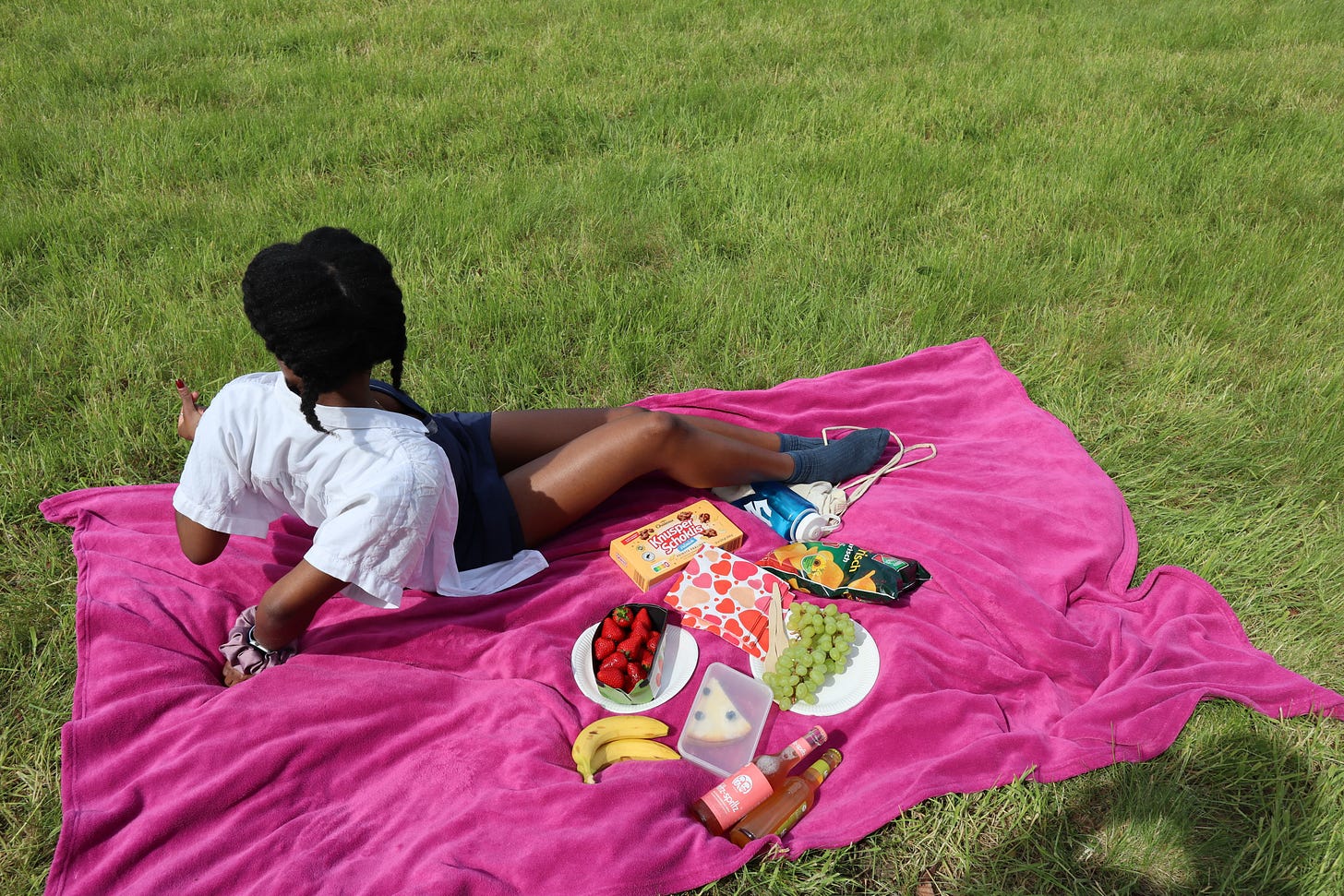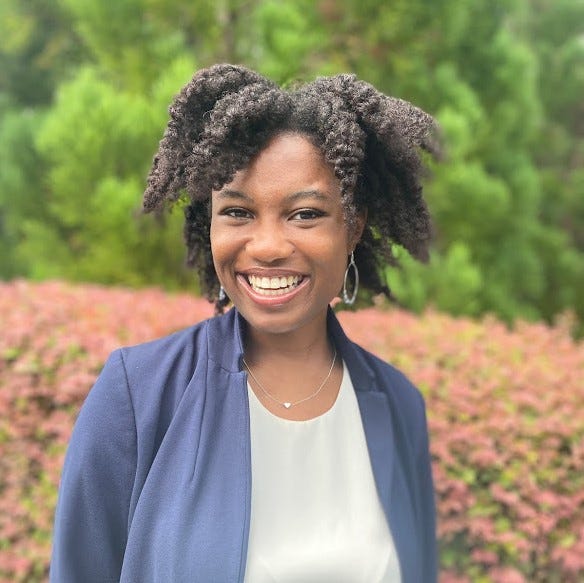Enjoying Carefree? Tap the heart & share it! 😍
Share on Twitter | Share on Facebook | Share via email | View past stories
Hey yall,
There has been a lot of chatter and chirping about Amanda Seales lately. I don’t want to add too much to the noise, but you’re reading a newsletter I publish so let’s get into it a lil bit!
I have followed Amanda Seale’s career since high school—back when she was rapping and spitting poetry on Def Poetry Jam. I have seen her live on her comedy tour, I used to listen to her podcast, Small Doses, and yes, I watched her on Insecure. In other words, I support her. In my past life, I worked in Black Media where many of my colleagues and industry peers worked directly with Amanda Seales and had pretty negative first-hand experiences with her. What’s being said about her today is not new, nor groundbreaking for those of us in the Black media/entertainment circuit (or “Black Hollywood” as she calls it), but thanks to this recent post she made about not being invited to the NAACP Awards, people who are just learning about her for the first time are starting to weigh in on this question: is it more important to be “likable” or stand ten toes down in your truth no matter the cost (whether it be relationships, career prospects, and love)?
According to Black Twitter and Black media outlets, likability is more important. It opens doors, gets you opportunities, and helps keep more people gravitating around you. But for someone like Amanda Seales, to whom truth and justice are the highest moral code to stick to, this is not the case. She doesn’t care that she’s likable, she cares that her truth is spoken—so why does everyone else care so much?
Because sometimes two things can be true at once. As long as I’ve followed her career or heard about her “attitude” over the years, I’ve still been a fan of Amanda. I don’t think it’d be super fun to hang out with her, but I love what she stands for and her work. I don’t find her likable, but I am a fan of her mission. That is possible, and that is okay! What I don’t think is possible, is knowing you’re this way but then turning around and wanting to be included in the spaces you believe are fake or don’t have love for you. I need Amanda Seales to own it. She knows she’s not well-liked, and she also knows that she looks down on certain Black spaces—so lean into that! While it’s never fun to be shunned by your peers and not be invited, she has still been able to build a robust audience of loyal fans who will support her. Focus on that. And by the looks of this upcoming tour she just announced, it looks like she is!
Thoughts?
PS - I went to a screening of Challengers a few days before it premiered. I had no idea what the movie was about, but once the final scene aired and the credits began to roll across the screen, the entire audience burst into an uproar of applause. It’s good.
This Week’s Story
I have a sore spot for stories about Black women moving abroad, charting their own path in a new country, and excitedly telling the tale. Maybe it’s because, as I say so often, it is how I began to chart my path in this world. Let’s head over to Berlin to meet this week’s writer, Avalon Pernell, who is rediscovering her Black womanhood in a German context.
Take care,
Anayo Awuzie
EIC of Carefree Magazine
Adventures Unknown: Sometimes You Must Leave To Grow
by Avalon Pernell
Nothing prepared me for the blank stares that greeted me when I told my family and friends I was moving back to Europe.
Are you sure?
You enjoyed your study abroad that much?
Why would you want to leave the US?
I tucked these concerns in the deep recesses of my brain, releasing them only as I set foot into Brandenburg Airport. In Germany, the air felt less heavy, more open to opportunities, and swirled with excitement.
In Berlin, I felt a weight lift from my shoulders. In the coming weeks, I would recognize this was what safety felt like. Here I felt free.
Moving abroad forced me to begin teasing out what it meant to be Black and a woman in the 21st century. For most of my life, I focused on the first identity, the words of my parents echoing in my ears of how I need to be twice as good to make it half as far. Life abroad provided an opportunity to learn what it meant to define Blackness outside of this American context.
This quest led me to research Afro-German identity formation in Berlin. I had previously studied abroad in the city during college and enjoyed my experience so much that I felt compelled to return. A stroll along the four stations and 22 streets contained in the African quarter in the Berlin-Wedding neighborhood revealed a vibrant community of businesses, restaurants, and creatives trying to make it in Germany’s capital. From Bantou Village, a local Afro-German owned restaurant to Each One Teach One, a community education and empowerment project, the African diaspora remained vibrant in Berlin. Yet, interspersed with the life created by Black-owned businesses and organizations in Berlin’s north district, Wedding, are whispers of Germany’s short, but brutal colonial past.
I soon realized that like Berlin, caught between its past and present, I was caught between my multi-hyphenate identities—Black, but also woman and American. But as I would quickly learn, I did not know how to define myself outside of those boxes. I was not able to fully grasp my experience as a Black woman until I juxtaposed it with my time in Germany.
From the neighborhood ice cream maker who always greeted me with a smile and a hearty “eins oder zwei Kugeln Heute?” to impromptu conversations with German grandmothers on the latest Deutsche Bahn delay, here daily conversations recognized my full personhood. Here, I wasn’t defined by education or career path. Instead, I could redefine myself to recognize the “and” instead of only acknowledging the “or”. Yes, I could be an ambitious career woman or the neutral peacemaker between parties, but I was also a friend, and listening ear, and creative. Here, I was not required to choose which identities to bring to the table–all were welcome.
Navigating these intersecting identities in Germany, helped me realize that being Black means a universal acknowledgment of what we share. It means the gentle nods of recognition from Black mothers and grandfathers when passing kebab stands and hair shops on the street.
Graffiti littered walls and stolen glances in a train between Black people sharing whole conversations of “Did you see that” and “I see you”. It’s the young Black child running up to compliment my coily afro and invitations to share meals where spices and flavors weave into a meal that nearly meets the caliber of your mom’s home cooking in a world many miles away from my original one.
It’s reminders of the things that bind us together across the diaspora and afternoon laughter shared with your next-door neighbor after long work days.
Through conversations, I remembered that there is no one correct way to be Black. As of 2020, the State Department estimated nearly 9 million Americans lived abroad. There are no current estimates of how many Black women make up this number, but I imagine my experience is not an exception to the rule.
Still, purchasing a flight didn’t promise an end to the proverbial baggage I carried from college into adulthood. You can’t run away from anxiety or outwork loneliness. According to the National Institute on Minority Health Disparities, African Americans are 20% more likely to face serious psychological distress than their white counterparts. And Black women are half as likely as their white counterparts to seek help and mental health care.
Life abroad is not perfect and living in Germany is not without its problems. There were plenty of days filled with complaining to my roommate and filling my journal with tear-streaked entries about longing for a genuine community. But hope peaked out its head in laughter, tinged conversations with the local baker, and late-night conversations with new friends at corner stores. Joy glimmered through shared smiles with neighbors walking their dogs in the morning and joke-filled catch-up sessions with next door neighbors. And happiness found me with spontaneous candlelit date nights and budding inside jokes among friends.
These moments were reminders that a life worth living takes intention. It requires grace and a recognition of the times when you should push to conquer fears and the times you should instead stop and rest. This life reminds us that your active participation is necessary for true community building, whether abroad or at home.
For me, it meant ignoring the chance of failure and signing up for pilates teacher training. What may seem like an easy choice for others, required me to remember that no one career defined me. My existence required acknowledgment of the multitudes. I could be a journalist and a pilates instructor and perhaps in the future, more.
An abundant life means recognizing your “no” is just as impactful as your “yes”. Often we adopt several roles to ease the lives of others: superwoman, peacekeeper, homemaker. These roles can sometimes mislead us into believing that we must always be hemmed into these identities to provide value to those around us. But actively choosing to hang up the superwoman cape and quit mythologizing sacrifice can allow you to retake control of your narrative. You are more than what you can offer others.
Your next step may require you to recognize how you can transform your life by choosing to ignore the peanut gallery and trust your intuition to carve out the best path for yourself.











